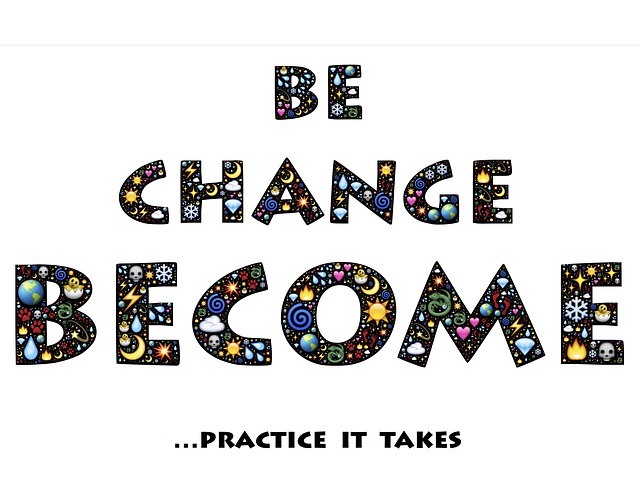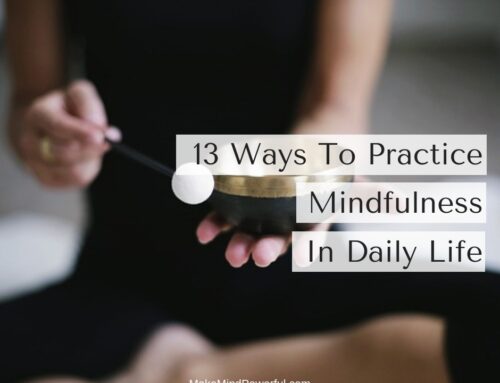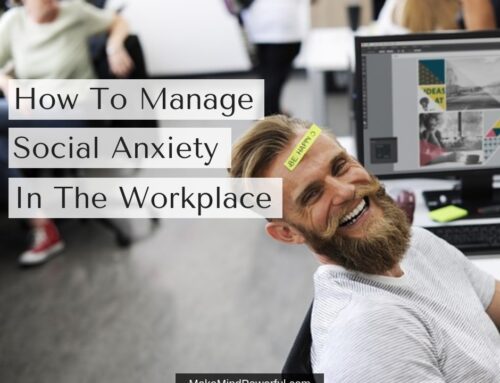
While I’m not a meditation guru, I learned mindfulness meditation at a young age. I have experienced the mental benefits of mindfulness as I meditated and how quickly my mind returned to chaos when I stopped meditating. Besides that, I’ve also overcome years of social anxiety through various means.
Mindfulness In A Nutshell
If you’re new to the concept of mindfulness, it is not about clearing your mind of all thoughts nor focusing on a single one. But that’s what we tried to do in socially anxious situations. By now, you should have realized that neither is possible nor effective when panic sets in.
Mindfulness is popularly defined as having the mind to fully attend to the present. But the characteristic of mindfulness that helps social anxiety is the ability of the mind to stop reacting emotionally to negative thoughts.
Recommended: 21 Mindfulness Meditation Meditation Tips For Daily Practice
When you have social anxiety, it’s common for you to be self-conscious of your appearance. With mindfulness, you can brush off the thoughts without resorting to hating yourself.
There is no shortage of articles showing how you can develop mindfulness in daily life. But I strongly believe that the best way to cultivate mindfulness is through the formal practice of meditation.
To get started, you can download a free copy of mindfulness meditation guide here.
How To Be Realistic With Your Mindfulness Practice
Mindfulness meditation is simple to practice. Yet I’ve seen many who struggled with anxiety gave up barely weeks after they started. If you’re doubtful about whether you’re practicing mindfulness the right way, here are some tips that may guide you along the way.
1. Mindfulness Is Not A Cure-All Solution
There are no questions that mindfulness helps improve the well-being of your mental health. With that said, mindfulness is not one and single resort to turn to in overcoming social anxiety.
To get a better picture, think of mindfulness practice as similar to increasing your stamina and strength in the gym. Yes, you’ll be able to lift weights and run for hours without catching your breath.
But there are skills that you cannot develop merely by going to the gym. You can’t be a great basketball player simply by running on the treadmills. Nor can you be an MMA fighter just by lifting weights alone.
What I’m trying to say is that mindfulness does increase your mental strength and may help in easing your anxious thoughts. But there are times when you need other methods or therapies to help you battle social anxiety.
2. Mindfulness Does Not Happen Instantly
If you’re freaking out because of a job interview tomorrow, it is pretty pointless to start learning meditation and hoping you can master mindfulness overnight. It takes time to build your six-packs and the same applies to mindfulness.
By getting this expectation right, you’ll avoid being disappointed and fall into the false conclusion that mindfulness doesn’t work. It does. But it takes weeks of consistent practice to make a positive difference in your mental health.
With that said, it is also important not to set goals when you’re practicing mindfulness meditation. Else, you would spend the entire meditation obsessing on getting results instead of meditating.
3. Do Not Make Mindfulness Complicated
Half Lotus or Burmese posture? What if you’re suffering a back-ache where you can’t sit comfortably for long? Do you watch your breathing at the nostril or the rise and fall of your abdomen?
Every meditation teacher may have their own style of teaching. If you’re a beginner, I would recommend sticking to a particular style to prevent getting confused. It’s important to understand the essence of mindfulness practice and the supporting guidelines that aim to help practitioner.
Mindfulness is about training the mind to note what’s happening at our six senses; seeing, hearing, touching, feeling, tasting and thinking. It trains us to be in control of our mind by being impartial and non-judgemental of the events.
It’s your personal preference if you want to meditate in the morning or at night. The same goes to sitting in a half-lotus posture or on a chair because of your backache. It is important not to mistake the form as the essence itself.
4. You Must Practice Mindfulness In Daily Life
I’ve mentioned that mindfulness is only efficient for beating social anxiety when you have meditated consistently for weeks. What I need to add on is that it is also important to incorporate mindfulness into your daily habit.
You can spend hours practicing public speaking and it is going to be different stepping up to hundreds of audience. The same is true with mindfulness. You need to try being mindful in the midst of distractions in daily life.
It’s impractical to watch your breathing when you’re eating or driving. But you can practice noting the taste of the food (it makes food tastier) or bringing your thoughts back to driving itself. Eventually, mindfulness will be an automatic response to situations that trigger your social anxiety. It allows you the option of being impartial and maintains a grip on your emotion.
5. Mindfulness Is Not The Absence Of Fear
If you have social anxiety, the fear of just walking into a group of strangers can be paralyzing. It sends thousands of anxious thoughts racing through your mind and you end up in wild imaginations of how foolish you must be in the eyes of others.
There are many benefits of mindfulness practice except eliminating fear. It was never the intention of mindfulness practice to eliminate fear. It is simply a misguided expectation for those who claim mindfulness does not work, just because they still feel the same rush of fear when trying to speak up.
Mindfulness, when practiced correctly and regularly, helps you to stay unaffected by fear. It allows you the opportunity to note that most of the fear that you’re experiencing are baseless. When you are noting your fear instead of reacting to it, you’ll find that eventually, it will subside by itself.
In a way, it helps you to conquer your fear.
Do check out this meditation app if you’re not making progress with mindfulness practice.
Did mindfulness practice help you in overcoming social anxiety? Or do you have more tips for doing so? Share your thoughts in the comments below.
Related
- 7 Signs You Are Beating Social Anxiety Just By Doing The Right Thing
- 5 Daily Habits That Secretly Damage Your Self-Esteem
- How To Meditate With Anxiety – Taming The Hyperactive Monkey Mind
- Why Mindfulness Practice Is Simple But Not Easy In Daily Life
- How To Overcome Social Anxiety At Work Before It Wrecks Your Career
- Best Meditation Cushion Sets For Mindfulness Practice







Leave A Comment